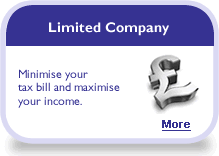Limited Companies
What is a Limited Company?
A Limited Company has a separate legal identity from the owners and directors and from a legal perspective is totally separate from its directors and shareholders. The profits and assets of the company belong to it, not you as the shareholder, profits made by the company are withdrawn by dividends to the shareholders or as salary to employees.
The principal advantages of Limited company can be summarized as follows:
- Directors and shareholders have limited liability. Except for cases of fraudulent or wrongful trading a director and shareholder are not personally liable for a company's debts.
- Profits can be withdrawn by way of dividend saving both employers and employees national insurance contributions
- Contractors can register for VAT under the flat rate scheme. Under this scheme a contractor invoices for VAT at the standard rate adding 20% VAT to their invoice value but only need pay over VAT at a lower flat rate percentage, typically 14.5%. The contractor gets to keep the surplus. The flat rate scheme surplus is also increased by 1% discount off the flat rate percentage in the first year of registration.
- Contractors operating through a limited company are classified by HM Revenue & Customs as site based employees and enjoy generous expenses deduction rules in respect of travel and subsistence.
- Personal life assurance can be paid through a Limited company as a relevant life policy. This means that the cost of life assurance is a tax deductible expense for the company and life assurance is paid out of a contractors gross pre-tax income as opposed to net post tax income.
- Dividends can be paid to your married spouse utilizing there unused personal and basic rate tax allowance. This is a very significant tax benefit where the spouse has low income. Subject to an individuals personal circumstances a married couple can distribute up to £78,000 without been liable to personal tax.
- On closure of the company a contractor can distribute retained profit as a capital gain. This allows each shareholder to offset their annual nil rate allowance of £10,600 and also claim entrepreneur relief so that any balance not covered by the nil rate allowance is subject to personal tax at just 10%.















